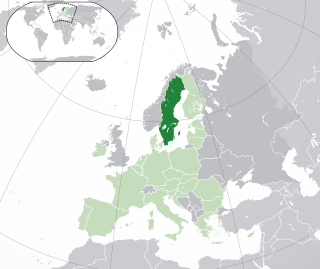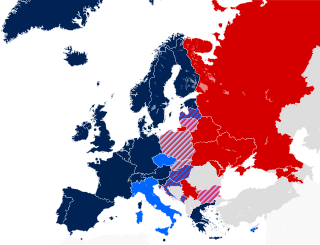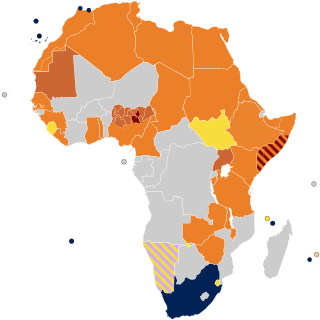| History of Sweden |
|---|
 |
| Timeline |
This article concerns LGBT history in the Nordic country of Sweden.
| History of Sweden |
|---|
 |
| Timeline |
This article concerns LGBT history in the Nordic country of Sweden.
Homosexuality in Sweden was decriminalised in 1944. [1] Same-sex marriage was legalized May 1st 2009, following the adoption of a gender-neutral marriage law by the Riksdag on April 1st of the same year. [2]
In 1950, the Swedish Federation for LGBT Rights (RFSL) was founded. [3]

Lesbian, gay, bisexual, and transgender (LGBT) movements are social movements that advocate for LGBT people in society. Although there is not a primary or an overarching central organization that represents all LGBT people and their interests, numerous LGBT rights organizations are active worldwide. The first organization to promote LGBT rights was the Scientific-Humanitarian Committee, founded in 1897 in Berlin.
Same-sex marriage, also known as gay marriage, is the marriage of two people of the same legal sex. As of 2024, marriage between same-sex couples is legally performed and recognized in 36 countries, with a total population of 1.5 billion people. The most recent jurisdictions to legalize same-sex marriage are Greece and Aruba and Curaçao in the Netherlands. Two more countries, Liechtenstein and Thailand, are set to begin performing same-sex marriages in early 2025.

Societal attitudes toward homosexuality vary greatly across different cultures and historical periods, as do attitudes toward sexual desire, activity and relationships in general. All cultures have their own values regarding appropriate and inappropriate sexuality; some sanction same-sex love and sexuality, while others may disapprove of such activities in part. As with heterosexual behaviour, different sets of prescriptions and proscriptions may be given to individuals according to their gender, age, social status or social class.

Opposition to legal rights for lesbian, gay, bisexual, and transgender (LGBT) people exists throughout the world. LGBT rights opponents may be opposed to the decriminalization of homosexuality; laws permitting civil unions or partnerships or supporting LGBT parenting and adoption, LGBT military members, access to assisted reproductive technology, and access to sex reassignment surgery and hormone replacement therapy for transgender individuals.

Lesbian, gay, bisexual, and transgender (LGBT) people in South Africa have the same legal rights as non-LGBT people. South Africa has a complex and diverse history regarding the human rights of LGBT people. The legal and social status of between 400,000 to over 2 million lesbian, gay, bisexual, transgender and intersex South Africans has been influenced by a combination of traditional South African morals, colonialism, and the lingering effects of apartheid and the human rights movement that contributed to its abolition.

The Swedish Federation for Lesbian, Gay, Bisexual, Transgender and Queer Rights is a Swedish organization working for LGBT rights.

The rights of lesbian, gay, bisexual, and transgender (LGBT) people in the United Kingdom of Great Britain and Northern Ireland have developed significantly over time. Today, lesbian, gay and bisexual rights are considered to be advanced by international standards.

Lesbian, gay, bisexual, and transgender (LGBT) rights in Sweden are regarded as some of the most progressive in Europe and the world. Same-sex sexual activity was legalized in 1944 and the age of consent was equalized to that of heterosexual activity in 1972. Sweden also became the first country in the world to allow transgender people to change their legal gender post-sex reassignment surgery in 1972, whilst transvestism was declassified as an illness in 2009. Legislation allowing legal gender changes without hormone replacement therapy and sex reassignment surgery was passed in 2013.

Lesbian, gay, bisexual and transgender (LGBT) individuals in the Republic of the Philippines have faced many difficulties in their homeland, such as displays of discrimination, prejudice, bigotry, hostility, violence, hatred, abuse, assault, harassment and other forms of anti-LGBT rhetoric. Many LGBT Filipinos are met with mixed attitudes and reactions by their families, friends and others in their communities, as well as professionals, educators, their national public officials, politicians, attorneys and others working for the government and the rest of the general population.

Lesbian, gay, bisexual, and transgender (LGBT) rights are widely diverse in Europe per country. 22 of the 38 countries that have legalised same-sex marriage worldwide are situated in Europe. A further 11 European countries have legalised civil unions or other forms of recognition for same-sex couples.

Lesbian, gay, bisexual, and transgender (LGBT) people in Rwanda face legal challenges not experienced by non-LGBT residents. While neither homosexuality nor homosexual acts are illegal, homosexuality is considered a taboo topic, and there is no significant public discussion of this issue in any region of the country and LGBT people still face stigmatization among the broader population. No anti-discrimination laws are afforded to LGBT citizens, and same-sex marriages are not recognized by the state, as the Constitution of Rwanda provides that "[o]nly civil monogamous marriage between a man and a woman is recognized". LGBT Rwandans have reported being harassed, blackmailed, and even arrested by the police under various laws dealing with public order and morality.

Lesbian, gay, bisexual, and transgender (LGBT) people in Uganda face legal challenges not experienced by non-LGBT residents. Same-sex sexual activity is illegal for both men and women in Uganda. It was originally criminalised by British colonial laws introduced when Uganda became a British protectorate, and these laws have been retained since the country gained its independence.

Lesbian, gay, bisexual, and transgender (LGBT) rights in Africa are generally poor in comparison to the Americas, Western Europe and Oceania.

Lesbian, gay, bisexual, and transgender (LGBT) people in Mongolia face legal and social challenges not experienced by non-LGBT people, though there have been substantial improvements since the 1990s. Homosexuality was criminalised in Mongolia in 1961 through its Criminal Code. Following the Mongolian Revolution of 1990 and the peaceful transition to a democracy, homosexuality was legalised and awareness about LGBT people has become more prevalent. Hate crimes on the basis of sexual orientation and gender identity result in additional legal penalties. Hate speech based on these two categories has been outlawed in the country since 1 July 2017. Households headed by same-sex couples are, however, not eligible for the same legal protections available to opposite-sex couples.

Lesbian, gay, bisexual, and transgender (LGBT) people in Mozambique face legal challenges not faced by non-LGBT people. Same-sex sexual activity became legal in Mozambique under the new Criminal Code that took effect in June 2015. Discrimination based on sexual orientation in employment has been illegal since 2007.
Communist attitudes towards LGBT rights have evolved radically in the 21st century. In the 19th and 20th century, communist parties and Marxist–Leninist states varied on LGBT rights; some Western and Eastern parties were among the first political parties to support LGBT rights, while others, especially the Soviet Union and some of its Eastern Bloc members, harshly persecuted people of the LGBT community.
LGBT conservatism refers to LGBT individuals with conservative political views. It is an umbrella term used for what is bifurcated into two specific sub-categories, each with its own term and meaning. The first sub-categorical term, Pre-Stonewall LGBT Conservatism, refers to LGBT individuals embracing and promoting the ideology of a traditional conservatism in either a general or specifically-LGBT social context or environment. The second sub-categorical term, Post-Stonewall LGBT Conservatism, refers to self-affirming LGBT persons with fiscally, culturally, and politically conservative views. These post-Stonewall conservatives' social views, though generally conservative too, at the same time reflect a self-determination-stemmed and more recent socio-historical "gay-affirmation" on issues like marriage equality for same-sex couples, gay family recognition, civic equality generally for LGBT people in society, and also a positive role for (gay-affirming) religion in LGBT life, though there is not complete unanimity of opinion among them on all issues, especially those regarding the dynamics and politics of the closet and "identity management," and various legal and political issues The first term can include LGBT people who are opposed to same-sex marriage or other LGBTQ rights while the second term, contrastingly, usually refers to self-affirming gay people who unequivocally favor marriage as a legal institution for both heterosexuals and gays and who simultaneously prefer economic and political conservatism more generally. The number of self-affirming LGBT advocates for conservative ideas and policies became more apparent only after the advent of the modern LGBT civil rights movement in the 1970s even as many gay conservatives, labeled as "self-hating" at the time, did remain closeted in areas where anti-gay socially conservative politicians then led the most organized opposition to LGBT rights. The Realpolitik and ideology situations for LGBT conservatives today vary by their own self-definition, and each country's sociopolitical, cultural, and legal LGBT rights landscape.
Australia is one of the most LGBT-friendly countries in the world. In a 2013 Pew Research poll, 79% of Australians agreed that homosexuality should be accepted by society, making it the fifth most supportive country in the survey behind Spain (88%), Germany (87%), and Canada and the Czech Republic. With a long history of LGBT rights activism and an annual three-week-long Mardi Gras festival, Sydney is considered one of the most gay-friendly cities in the world.
This article gives a broad overview of lesbian, gay, bisexual and transgender (LGBT) history in Canada. LGBT activity was considered a crime from the colonial period in Canada until 1969, when Bill C-150 was passed into law. However, there is still discrimination despite anti-discrimination law. For a more detailed listing of individual incidents in Canadian LGBT history, see also Timeline of LGBT history in Canada.

The following is a timeline of lesbian, gay, bisexual, and transgender (LGBT) history in the 20th century.